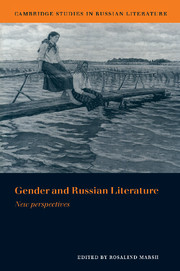Book contents
- Frontmatter
- Contents
- Notes on contributors
- Acknowledgements
- 1 Introduction: new perspectives on women and gender in Russian literature
- PART I HISTORICAL AND BIOGRAPHICAL PERSPECTIVES
- PART II THE PERSPECTIVE OF LITERARY CRITICISM
- 12 The silence of rebellion: women in the work of Leonid Andreev
- 13 Poor Liza: the sexual politics of Elizaveta Bam by Daniil Kharms
- 14 The crafting of a self: Lidiia Ginzburg's early journal
- 15 Voyeurism and ventriloquism: Aleksandr Velichanskii's Podzemnaia nimfa
- 16 Thinking self in the poetry of Ol′ga Sedakova
- 17 Women's space and women's place in contemporary Russian fiction
- Index
- CAMBRIDGE STUDIES IN RUSSIAN LITERATURE
14 - The crafting of a self: Lidiia Ginzburg's early journal
Published online by Cambridge University Press: 06 July 2010
- Frontmatter
- Contents
- Notes on contributors
- Acknowledgements
- 1 Introduction: new perspectives on women and gender in Russian literature
- PART I HISTORICAL AND BIOGRAPHICAL PERSPECTIVES
- PART II THE PERSPECTIVE OF LITERARY CRITICISM
- 12 The silence of rebellion: women in the work of Leonid Andreev
- 13 Poor Liza: the sexual politics of Elizaveta Bam by Daniil Kharms
- 14 The crafting of a self: Lidiia Ginzburg's early journal
- 15 Voyeurism and ventriloquism: Aleksandr Velichanskii's Podzemnaia nimfa
- 16 Thinking self in the poetry of Ol′ga Sedakova
- 17 Women's space and women's place in contemporary Russian fiction
- Index
- CAMBRIDGE STUDIES IN RUSSIAN LITERATURE
Summary
From the perspective of the 1980s, when Lidiia Ginzburg's remarkable achievement as a scholar and writer finally received public recognition, she could refer back to her student years as being in tune with history: ‘The 1920s were for me the Institute of the History of the Arts, and my introduction to the cultural-historical currents, which simultaneously both confronted the epoch and were spawned by the epoch … It seemed to us – and so it was for a short time – that we were the principal actors in a segment of culture which had just begun.’ As a participant in the ‘young Formalist’ collective and hence part of the dynamic rethinking of the educational system, Ginzburg did not regard her professional life as marginalized until the Institute was forcibly closed down in 1930. Her involvement in the struggle by and for the thinking woman in the Soviet Union of the 1920s might be characterized as that of a first generation egalitarian or ‘existential feminist’ in Julia Kristeva's definition, as one of those ‘women in the socialist countries of Eastern Europe’ who demanded equal rights with men, and whose demands for economic, political and professional equality ‘have, to a great extent, been met’.
On the other hand, Ginzburg was hardly unaware of what Kristeva termed ‘the fourth equality’ – ‘sexual equality, implying permissiveness in sexual relations (including homosexual relations)’ which was ‘stricken by taboo in Marxian ethics as well as for reasons of state’.
- Type
- Chapter
- Information
- Gender and Russian LiteratureNew Perspectives, pp. 263 - 282Publisher: Cambridge University PressPrint publication year: 1996
- 1
- Cited by



